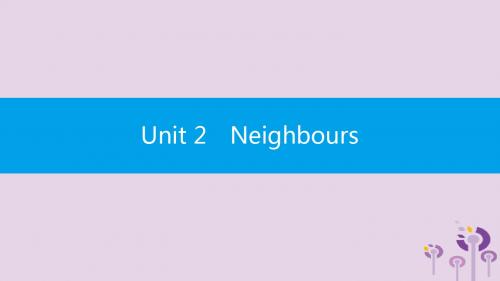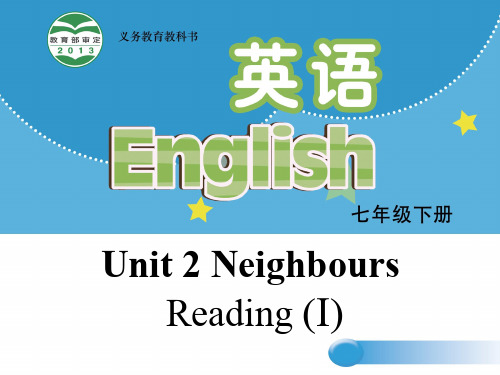江苏省盱眙县黄花塘初级中学七年级英语下册 Unit 2 Neighbours(第1课时)教案 (新版)牛津版
七年级英语下册 Unit 2 Neighbours句型知识梳理 牛津版(2021年整理)

七年级英语下册Unit 2 Neighbours句型知识梳理(新版)牛津版编辑整理:尊敬的读者朋友们:这里是精品文档编辑中心,本文档内容是由我和我的同事精心编辑整理后发布的,发布之前我们对文中内容进行仔细校对,但是难免会有疏漏的地方,但是任然希望(七年级英语下册Unit 2 Neighbours句型知识梳理(新版)牛津版)的内容能够给您的工作和学习带来便利。
同时也真诚的希望收到您的建议和反馈,这将是我们进步的源泉,前进的动力。
本文可编辑可修改,如果觉得对您有帮助请收藏以便随时查阅,最后祝您生活愉快业绩进步,以下为七年级英语下册Unit 2 Neighbours句型知识梳理(新版)牛津版的全部内容。
Unit2 句型知识梳理I'm afraid+从句应翻译为恐怕,不能翻译成我害怕,通常不写成He’s afraid或She's afraid I’m afraid my brother has no time to play with me. 恐怕我哥哥没时间陪我玩。
I’m afraid it is going to rain tomorrow。
恐怕明天会下雨.welcome visitors like you 欢迎像你这样的来访者in your neighbourhood 在你的居民区里around your neighbourhood在你的居民区周围most of them 他们中的大多数人 some of them他们中的一些人It is形容词to do sth. 做某事是………It's very important to learn English well. 学好英语是非常重要的。
It is polite to say hello to your teachers every morning.每天早晨向你的老师们问好是有礼貌的.It is形容词for sb to do sth. 对某人来说做某事是………It’s easy for my father to drive this car. 对我爸来说驾驶这辆车很容易。
牛津译林版英语七下Unit 2《Neighbours》(Task)教学设计

牛津译林版英语七下Unit 2《Neighbours》(Task)教学设计一. 教材分析牛津译林版英语七下Unit 2《Neighbours》主要介绍了关于邻居的话题。
通过学习本单元,学生能够掌握与邻居相关的词汇和表达方式,学会如何描述邻居的特点和习惯,以及如何用英语进行简单的日常交流。
本单元的主要语言点包括形容词和副词的比较级和最高级形式,以及一般现在时态的运用。
二. 学情分析七年级的学生已经具备了一定的英语基础,能够听懂并运用一些基本的英语句型进行交流。
但是,对于形容词和副词的比较级和最高级形式以及一般现在时态的运用可能还不够熟练。
因此,在教学过程中,需要注重对这些语言点的讲解和操练,以确保学生能够正确运用。
三. 教学目标1.知识目标:–能够听懂、会说、会读本单元的生词和重点句子。
–掌握形容词和副词的比较级和最高级形式。
–学会用英语描述邻居的特点和习惯。
–能够运用一般现在时态进行简单的日常交流。
2.能力目标:–能够运用本单元所学知识进行简单的对话交流。
–能够正确运用形容词和副词的比较级和最高级形式。
3.情感目标:–培养学生对邻居的尊重和关心。
–培养学生的团队协作精神。
四. 教学重难点1.教学重点:–形容词和副词的比较级和最高级形式。
–一般现在时态的运用。
–与邻居相关的词汇和表达方式。
2.教学难点:–形容词和副词的比较级和最高级形式的运用。
–一般现在时态的运用。
五. 教学方法1.任务型教学法:通过设定各种任务,让学生在实际语境中运用所学知识,提高学生的语言运用能力。
2.情境教学法:创设各种生活情境,让学生在真实的语境中学习英语。
3.合作学习法:引导学生进行小组讨论和合作,培养学生的团队协作精神。
六. 教学准备1.教学课件:制作课件,包括本单元的生词、句子、图片等。
2.教学材料:准备与邻居相关的图片、故事等材料。
3.教学设备:投影仪、电脑等。
七. 教学过程1.导入(5分钟)利用课件展示与邻居相关的图片,引导学生进行观察和思考,引出本课的主题。
七年级英语下册 Unit 2 Neighbours知识点精讲(上)牛津版

U2基础知识梳理(上)(建议2-5分钟)1 23 4I will take some presentsto visit them tomorrow.Questions: 1. Do you know anything about your neighbors?2. How do you get on with your neighbors?精品一、词汇Words1.___________ 邻居(英式英语)neighbor为美式英语neighbor用作名词,意为“邻居”,指居住在同一座楼、同一小区、同一街区的人数其复数形式是___________.2.like 像,相似,类似(1)like用作介词,指某人或某物“像,相似,类似”。
常用的固定搭配有像…样子______________________;看起来像______________________;例1:我不欢迎像你这样的人。
____________________________________________例2:这个女孩看起来像她的父亲。
____________________________________________(2) like 也可以用作动词,表示“喜欢”之意,常用的固定搭配:like sb/sth 喜欢某人/某物_______________ 喜欢做某事(习惯)_______________ 喜欢做某事(具体的事)练习:1. He_______ his father because he wants to speak English______ his father.A. like; likeB. likes; likesC. likes; likeD. like; likes2. I need a bike_________.A. like youB. like yourC. like yoursD. likes you3. John, ______ his father, _______ playing basketball.A. likes; likeB. like; likesC. likes; likesD. like; like4. Do you like any sports like_______, _______ or________?A. swimming; playing basketball; runB. swimming;playing basketball; runningC. swim;play basketball; runD. to swim; to play basketball; to run3.waiter (参观等)服务员名词,意为“(餐馆等)服务员”,是由动词wait 加后缀-er构成的,其对应词为___________,意为“女侍者,女服务员”。
七年级下册英语unit2NeighboursReadingII课件新版牛津版

share their different skills help us with all kinds of problems help the boy with his homework
help the old clean the flat do some shopping ask a computer engineer to check it fix the girl's bicycle
Simon's neighbours
This volunteer often ___d_o_e_s_s_o_m__e_s_h_o_p_p_i_n_g__ for the old.
These volunteers are helping the old ______c_le_a_n__th_e__f_la_t___________.
If there is something wrong with your computer, you can _a_s_k_a_c_o_m__p_u_te_r_e_n_g_i_n_e_e_r_to__c_h_e_c_k_i_t __ . If your bicycle is broken, someone is going to ___h_e_l_p_y_o_u__fi_x_i_t_____. Some college students are ready to __h_e_lp__y_o_u_w__it_h_y_o_u_r_h_o_m__e_w_o_r_k___. Some people from the centre will help the old people and ___d_o_s_o_m_e__s_h_o_p_p_in_g_ for them.
牛津译林版七年级下册Unit 2《Neighbours》(Study skills)教学设计

牛津译林版七年级下册Unit 2《Neighbours》(Study skills)教学设计一. 教材分析牛津译林版七年级下册Unit 2《Neighbours》主要讲述了关于邻居的话题。
通过本节课的学习,学生能够掌握与邻居相关的词汇和表达方式,学会如何用英语询问和描述邻居的信息。
教材中包含了丰富的插图、对话和练习,有助于激发学生的学习兴趣,提高他们的语言运用能力。
二. 学情分析七年级的学生已经具备了一定的英语基础,能够听懂并运用简单的英语进行交流。
但他们在口语表达和词汇积累方面仍有待提高。
此外,学生对身边的事物和人物较为熟悉,因此对邻居这一主题应能产生共鸣,有利于激发学习兴趣。
三. 教学目标1.知识目标:学生能够掌握与邻居相关的词汇和表达方式,如:neighbor, opposite, across from等。
2.能力目标:学生能够用英语询问和描述邻居的信息,提高他们的语言运用能力。
3.情感目标:学生能够学会与邻居友好相处,培养良好的邻里关系。
四. 教学重难点1.重点:掌握与邻居相关的词汇和表达方式。
2.难点:如何用英语询问和描述邻居的信息。
五. 教学方法1.情境教学法:通过设置真实的生活情境,让学生在实际语境中学习英语。
2.交际法:鼓励学生进行互动交流,提高他们的口语表达能力。
3.任务型教学法:通过完成具体任务,培养学生运用英语解决问题的能力。
六. 教学准备1.教师准备:教材、教案、多媒体教学资源。
2.学生准备:课本、笔记本、文具。
七. 教学过程1.导入(5分钟)教师通过提问方式引导学生谈论身边的人和事,如:“Do you know your neighbors? What kind o f people are they?”,激发学生的学习兴趣。
2.呈现(10分钟)教师展示教材中的插图,引导学生观察并说出邻居的名称。
然后,教师通过PPT呈现邻居的词汇和表达方式,如:neighbor, opposite, across from等,让学生跟读并模仿。
牛津译林版英语七下Unit 2《Neighbours》(Grammar)教学设计

牛津译林版英语七下Unit 2《Neighbours》(Grammar)教学设计一. 教材分析牛津译林版英语七下Unit 2《Neighbours》主要讨论了与邻居相关的日常交流情景。
通过本单元的学习,学生将掌握如何描述邻居的特点、交流邻居之间的互动以及表达自己对邻居的看法。
本单元的核心语法是现在进行时态,用于描述正在进行的动作或状态。
此外,学生还需熟悉和掌握一些与邻居相关的词汇和表达方式。
二. 学情分析七年级的学生已经具备了一定的英语基础,能够听、说、读、写一些简单的英语句子。
但他们在使用现在进行时态和描述邻居特点方面可能存在一定的困难。
因此,在教学过程中,需要关注学生的个体差异,有针对性地进行教学。
三. 教学目标1.知识目标:–掌握现在进行时态的用法;–学会描述邻居的特点和交流邻居之间的互动;–学会表达自己对邻居的看法。
2.能力目标:–能够熟练运用现在进行时态进行日常交流;–提高听力、口语、阅读和写作能力;–培养合作意识和团队精神。
3.情感目标:–增强对英语学习的兴趣;–学会尊重和理解他人,培养良好的邻里关系。
四. 教学重难点•现在进行时态的用法;•描述邻居特点和交流邻居之间的互动;•表达自己对邻居的看法。
•现在进行时态的运用;•准确描述邻居特点和交流邻居之间的互动。
五. 教学方法1.情境教学法:通过设定真实的邻里场景,让学生在实际语境中学习和运用英语;2.交际教学法:鼓励学生进行角色扮演,模拟邻里之间的交流,提高口语表达能力;3.任务型教学法:通过完成小组任务,培养学生合作意识和团队精神;4.反馈与激励:及时给予学生反馈,鼓励学生积极参与课堂活动。
六. 教学准备1.教材:牛津译林版英语七下Unit 2《Neighbours》;2.多媒体课件:图片、视频、音频等教学资源;3.学习任务单:用于引导学生进行小组讨论和任务完成;4.板书用品:黑板、粉笔等。
七. 教学过程1.导入(5分钟)利用图片或视频展示邻居之间的日常生活场景,引导学生谈论自己的邻居。
牛津译林版英语七下Unit2《Neighbours》(Revision)说课稿

牛津译林版英语七下Unit 2《Neighbours》(Revision)说课稿一. 教材分析《Neighbours》(Revision)是牛津译林版英语七年级下册的一个单元,主题是邻里关系。
本单元通过描述不同国家的邻里特点,让学生学会如何用英语表达邻里之间的关系,并培养学生热爱生活、关注社区的情感。
本单元的主要内容包括:词汇、对话、阅读理解和写作等。
二. 学情分析根据对学生的了解,他们在学习英语的过程中已经掌握了基本的听说读写技能,但对邻里关系的认识较少,需要通过本节课的学习来拓展他们的视野。
此外,学生对本单元的主题可能存在一定的兴趣,可以激发他们的学习积极性。
三. 说教学目标1.知识目标:学生能够掌握本单元的词汇和句型,运用所学知识描述邻里关系。
2.能力目标:学生能够在真实情境中运用英语进行交流,提高口语表达能力。
3.情感目标:培养学生热爱生活、关注社区的情感,增强邻里之间的友谊。
四. 说教学重难点1.重点:本单元的词汇和句型,以及如何运用所学知识描述邻里关系。
2.难点:如何运用英语进行有效的邻里交流,以及在实际情境中运用所学知识。
五. 说教学方法与手段1.采用任务型教学法,让学生在完成任务的过程中掌握所学知识。
2.运用多媒体教学手段,如图片、视频等,激发学生的学习兴趣。
3.小组讨论,培养学生合作学习的能力。
六. 说教学过程1.导入:通过展示一幅邻里和谐的图片,引导学生关注邻里关系,激发学习兴趣。
2.呈现词汇:引导学生根据图片猜测词汇,并给出正确答案,让学生初步掌握本单元的词汇。
3.学习句型:通过对话教学,让学生学会如何用英语描述邻里关系。
4.实践环节:学生进行角色扮演,模拟邻里之间的交流,巩固所学知识。
5.阅读理解:引导学生阅读一篇关于邻里关系的短文,提高学生的阅读能力。
6.写作练习:让学生撰写一篇关于邻里关系的短文,培养学生的写作能力。
7.总结:对本节课所学内容进行总结,强化学生对邻里关系的认识。
牛津译林版七年级英语下册Unit 2 Neighbours 重难点知识归纳总结

17.on the afternoon of 5 March在三月五号的下午
18.all the day整天
19.know a lot about styles and colours对风格和颜色很了解
20.be happy to give you some ideas很高兴给你一些主意
牛津译林版七年级英语下册
Unit 2 Neighbours重难点知识归纳总结
【重点单词】
1.neighbour ['neɪbə] n.邻居
2.will [wɪl] modal v.将;将会
3.visitor ['vɪzɪtə] n.访问者,参观者
4.like [laɪk] prep.像,类似;……怎么样
【重点句型】
1.I am afraid they won’t welcome visitors like you.
我恐怕他们不会欢迎像你这样的客人。
2.It’s good to live in a neighbourhood like that.
住在那样一个小区很好。
3.What are your neighbours like?
34.artist ['ɑːtɪst] n.艺术家
35.sound [saʊnd] linking v.听起来
36.sick [sɪk] adj.生病的;恶心的
37.notice ['nəʊtɪs] n.布告,通知
rmation [ˌɪnfΒιβλιοθήκη 'meɪʃən] n.信息
39.below [bɪ'ləʊ] adv.下面
5.waiter ['weɪtə] n.(餐馆等的)服务员
七年级英语下册Unit2Neighbours词汇与语法基础训练新版牛津版

Unit 2 Neighbours 知识精讲一、必背词汇neighbour n. <英>邻居 =<美>neighborwill modal v. 将,将会visitor n. 访问者,参观者like prep. 像,类似;……怎么样waiter n. (餐馆等的)服务员neighbourhood n. <英>街区,居民区 =<美>neighborhood helpful adj. 愿意帮忙的;有用的volunteer n. 志愿者,义务工作者community n. 社区skill n. 技能,技巧problem n. 问题,难题something pron. 某事,某物engineer n. 工程师;技师check vt. 检查;核实broken adj. 损坏了的;破碎的someone pron. 某人fix vt. 修理anyone pron. 任何人college n. 学院lucky adj. 幸运的shall v. 将,将会fire n. 火manager n. 经理office n. 办公室policeman n. (pl. policemen)警察postman n. (postmen)邮递员company n. 公司station n. 局,所,站post n. 邮政person n. 人job n. 工作elder adj. 年纪较长的future n. 将来artist n. 艺术家,(尤指)画家sound v. 听起来sick adj. 生病的;恶心的notice n. 布告,通知information n. 信息below adv. 下面better adj. (good/well的比较级)较好,更好anything pron. 任何事design vt 设计,构思group n. 组,群二、重点词汇1. neighbour noun /ˈneɪ.bər/1). someone who lives very close to you邻居例句:Some of the neighbours have complained about the noise from our party.有些邻居已经抱怨过我们的聚会太喧闹。
Unit 2 Neighbours-七年级英语下单元话题满分写作

2021-2022七年级英语下学期单元话题满分写作Unit 2: Neighbours单元话题:Helping each other “邻里互助”范文11.俗话说“远亲不如近邻”, 邻居对我们的生活非常重要。
请你根据下面的提示, 以“My Neighbour”为题,写一篇作文。
要点如下:1. 我是Jim,我有一个新邻居叫Peter。
我和他住同一栋楼,他住在五楼。
2. 他是一名导游(tour guide),他喜欢带领游客游览不同的城市。
在未来,他打算环游世界;3. 他非常乐于助人,当人们遇到各种问题时,都向他求助;4. 我的感受……(2-3句)______________________________________________________________________________________ ______________________________________________________________________________________ ______________________________________________________________________________________ ______________________________________________________________________________________ ______________________________________________________________________________________ ___________________________________________________________________________________【答案】范文:My NeighbourAs the saying goes "A neighbor is better than a distant relative". Neighbors are very important in our lives.I am Jim. I live in Sunshine Community. I have a new neighbour, Peter. We live in the same building. He lives on the fifth floor. He is a tour guide. He likes showing visitors around different cities. He is going to travel around the world in the future. He works hard. He is kind-hearted and ready to help others. When people are in trouble, they usually ask him for help. Everyone in our neighbourhood likes him. So we are lucky to have a nice neighbour.I think we should help each other in our neighbourhood. I like our neighbors.【解析】【详解】1.题干解读:该题目属于说明文写作,在写作时要根据汉语提示的内容来介绍自己的新邻居,包括名字、住所、职业、爱好、性格等方面,最后再写出自己的感受。
苏教牛津译林版七年级下册英语(7B)unit 2 Neighbours reading 课件

adj. 愿意帮忙的/有用的
n. 志愿者, n. 社区 n. 技能,技巧 帮助某人解决某种困难 n. 问题,难题 pron. 某事,某物 n. 工程师;技师
Words & phrases review
9.check 10.broken 11.someone 12.fix 13.anyone 14.college 15.do some shopping
2. When and where do they often meet ? They often meet at the community centre at the weekend.
3. What do they do to help others?
…check the computer… ; …fix the bicycle…; …help with homework; …help the old people (visit…do some shopping…clean…)
primary school 小学
Junior middle school 初中 Senior middle school 高中
College 学院 University 大学
the day after tomorrow yesterday 昨天 前天我丢了手机。
前天
I lost my mobile phone .....
I’m going to ask a computer_e_n_g_i_n_e_er_ to check it. My cousin Annie’s =bike _b_i_c_y_c_le_ is broken, so she’s going to ask someone to _f_ix__ it. Amy: Can you find _a_n_y_o_n_e_ to help you with your homework?
七年级英语下册 Unit 2 Neighbours话题微写作课件 (新

Байду номын сангаас
1.There is something wrong with my alarm clock.我的闹钟出问题了。 2.They often meet at the community centre and share their different skills.他们经常在社区中心集 合,并和大家分享各自的一技之长。 3.They help us with all kinds of problems.他们帮助我们解决各种各样的问题。 4.They often visit the old people and do some shopping for them.他们经常拜访老人,并为他们买 一些东西。 5.You’re lucky to live in a family like that.你生活在这样的家庭很幸运。 6.Don’t worry about what to wear to the party.不要为聚会穿什么而担心。 7.He will welcome the visitors like you.他会很欢迎像你们这样的拜访者。 8.I’m happy to share my story.我很高兴能分享我的故事。 9.Please look at the notice board in the playground.请看一下学校操场上的公告栏。 10.Kathy has to go to school at eleven.凯西11点要去学校。
Unit 2 Neighbours
本单元的话题是“社区环境与邻里关系”。学生主要围绕“社区生活”进行写作。在具体的写 作中,学生应做到以下几点:
1.能描述自己生活的社区的环境和基础设施; 2.能描述一些社区活动及自己的感受; 3.能为社区的发展提供一些建议。
七级英语下册Unit2NeighboursTask课件(新版)牛津版

Art & Design Group
Fix-It Club
1. Mr Green is not feeling well these days. 2. There is something wrong with Lily’s fridge. 3. Miss Zhang worries about what to wear to a party. 4. Grandma Chen’s washing machine is not working well. 5. Mrs Ma does not know how to design her home.
community centre
adv.
5 March
doctors and nurses
make them feel better
engineers something wrong
conj.
styles and colours
what to wear to a party how to design the home
Unit 2 Neighbours Task
Free talk
• Is there a community centre in your neighbourhood? • What do your neighbours do? • Do you think it’s helpful to have a community centre? • What kind of help do you want to get from the
make you feel better
Helping each other
The car is broken. = There is something wrong with
江苏省盱眙县黄花塘初级中学七年级英语下册 Unit 2 Neighbours(第4课时)教案 (新版)牛津版

Unit 2 NeighboursGrammarI. Teaching aims and learning objectivesBy the end of the lesson, students should be able to:1. know what the simple future tense is;2. learn how to use the simple future tense correctly;3. talk about things that will happen in the future.II. Teaching contentsNew words and p hrases: shall, fire, the day after tomorrow, make a fireIII. Focus of the lesson and predicted area of difficulty1. To use the simple future tense correctly.2. To talk about the actions t hat will happen in the future.IV. Teaching proceduresA Simple future tense with will and shallStep 1 Revision1. Enjoy a song.T: First, please enjoy a song. Let’s sing together. How will the school be today?2. About Simon.(1) Where does Simon live?(2) What do you think of his neighbours?(3) Do you think Simon is lucky to live in such a neighbourhood? Why?3. About Simon’s neighbours.T: Some of Simon’s neighbours have some problems. How can they get help from the community centre?T: In these sentences, we use be going to and will to talk about things that will happen in the future. This tense i s called the simple future tense.Step 2 Presentation1. will + verb …T: Neil and Jack are my new friends. Let’s listen to a story about them, and then answer the following questions.(1) How old will Jack be?(2) What will Neil buy for Jack?(3) How many miles will Jack run each day?T: We use will + verb…to ex press the simple future tense.2. will or shall.(1) Match the subjects on the left with will or shall on the right.(2) Learn about some short forms about will and shall.(3) Read a chant.3. The basic form.Complete the tables about the simple future tense with will or shall.4. The usage of the simple future tense with will or shall(1) Use will or shall to complete the sentences.We use will or shall to talk about things that are sure to happen in the future.(2) Ask and answer in pairs: What will you do this evening?We use will or shall to talk about plans that we are making now.Step 3 Practice1. Complete the conversation.T: Complete the conversation between Mr Lin and Simon wit h the simple future tense of the verbs in brackets.2. Pair work.T: Work in pairs and talk about what you will do this weekend.B Simple future tense with be going toStep 1 Presentation1. More about Neil and Jack.T: Do you want to know mo re about Neil and Jack? Let’s watch the video and f ind out where Jack is going and what he is going to do.T: We use be going to do…to express the simple future tense.2. Match the subjects with be going to.3. Learn about some short forms about be going to.4. Work out the basic form.T: Complete the tables about the simple future tense with be going to.5. The usage of the simple future tense with be going to.(1) Use be going to to talk about something we decide to do.(2) Pair work.T: Jack will be 50 years old in two days. Work in pairs and talk about what you are going to buy for him.(3) Use be going to to talk about things that will probably happen.(4) Fill the blanks with the correct forms of be going to.Step 2 Practice1. Complete the conversation.T: Simon is going to have a day out with his uncl e’s family the day after tomorrow.Complete his conversation with Amy by using the correct forms of be going to.2. Plan a day out for Neil and Jack.T: Is Neil really going to buy a car for Jack?T: Work in groups of four and plan a day out for Neil and Jack. Here are some points which may help you. Remember to use the simple future tense we learned today.Step 3 SummaryT: Boys and girls, today we’ve learnt the simple future tense.(1) What do we use the simple future tense to talk about?(2) Do you still remember the basic forms of the simple future tense?(3) When shall we use the simple future tense?(4) What time expressions are always used with the simple future tense?V. HomeworkFinish writing the visiting plan for Neil and Jack.【教学反思】。
七年级下册英语Unit 2 Neighbours 教案(牛津版)

七年级下册英语Unit 2 Neighbours 教案(牛津版)七年级下册英语Unit2Neighbours教案(牛津版)Unit2Neighbourswelcometotheunit新课导入通过反映邻里关系的图片入手,对学生进行提问。
.whatcanyouseeinthe4pictures?2.canyoutellmesomethingabouteachpicture?然后,导入本单元话题“neighbors”。
新课讲授Step1Discussion.whatcanyouseeinthepictures?2.canyoutellmesomethingabouteachpicture?Step2Newwords教师出示生词及音标带领学生齐读,并解释单词的用法。
Step3PartAwherecanyoufindthesepeople?matchthemwiththeplaces.writethecorrectlettersintheb oxes.Step4AskandanswerA:what'shis/herjob?B:He/Sheisa/an...Step5PartB.AmyisaskingSimonabouthisneighborhood.whatareth esequestionsabout?Pleaselistentothetapeandwritedown..wheredoyoulive?2.Howmanybuildingsarethereinyourneighborhood?3.whatdoyouhavearoundyourneighborhood?4.Doyoulikelivingthere?2.Listentothetapeandfillintheblanks.Simonlivesina___incityGardeninNinthStreet.Therearea bout___buildingsinhis______________.mostofthemhave_ __floors.It’s_____forSimonandhisneighborstolivethere,becausethe rearesomesupermarkets,__________,aschoolanda_______.keys:flat,20,neighborhood,14,good,restaurant,hospital3.Listentothetapeagainandanswerthequestions..where’sSimion’sflat?2.Howmanybuildingsarethereinhisneighborhood?3.Howmanyfloorsdothebuildingshave?4.whatdoesSimonhavearoundhisneighborhood?5.whatdoesSimonthinkofhisneighborhood?keys:It’sincityGardeninNinthStreet.About20building.mostofthemhave14floors.Supermarkets,restaurants,aschoolandahospital.Hethinksit’sgoodtoliveinaneighborhoodlikethat.Step6Pairworkanddiscussion..workinpairsandmakeupyourownconversationaboutyo urneighborhood.2.workwithyourpartner.makeadialoguelikethisone.A:wheredoyoulive?B:Ilivein...A:Arethereanybuildingsaroundyourneighborhood?B:...A:whatarethey?B:Theyare...A:Doyoulikelivethere?B:...A:Bytheway,what’syourfather?B:Heisa/an...Heworksin...A:whataboutyourmother?B:She...A:Dotheyhaveanytimetoplaywithyou?B:...Step7Lookattheflash.)Answerthequestionsaccordingtothevideo.2)watchthevideoagainandfillintheblanks.Step8Homework一、翻译下面的句子。
七年级英语下册 Unit 2 Neighbours Reading I课件 (新

My neighbours are kind and helpful. Some of them are volunteers. They have ________________ and often help us with _______________ problems. Usually there is a “helping hands” meeting ______________.
2. Usually there is a meeting at the weekend.
3. Simon wants to ask someone to fix
his bcoicmypculete. r 4. Annie’sbcicoymcleputer is broken. 5. PCaorlleegnets help the children with
What do people do at the community centre?
hheellpp…you with your homework
vivsiistith…e old people
What do people do at the community centre?
do s…ome shopping for the old people
Some old people need help.
ask sb to fix it
help sb with sth
do some shopping help clean their flats
Read and judge
1. Volunteers share their skills and help people in the neighbourhood with different problems.
七年级英语下册Unit2Neighbours课本知识整理(pdf)(新版)牛津版

7B Unit2NeighboursWarm up一、重点单词1.neighbour n.邻居2.visit v.拜访;参观3.meet v.遇见;会面4.afraid v.害怕5.visitor n.拜访者;参观者6.neighbourhood n.街区;居民区7.discuss v.讨论8.like prep.像,类似;...怎么样二、重点词组1.be afraid of...害怕...2.help each other互相帮助三、重点句型1.---Where are you going?你打算去哪儿?---I’m going to...我打算去...2.I’m afraid they won’t welcome visitors like you.恐怕他们不会欢迎像你这样的访客。
Welcome to the unit一、重点单词1.below adv.下面2.flat n.公寓3.cook n.厨师/v.煮菜4.building n.建筑5.floor n.层6.supermarket n.超市7.restaurant n.餐厅8.hospital n.医院二、重点词组1.ask sb.about sth.问某人关于某事2.talk about sth.谈论关于某物3.in Ninth Street在第九大街4.live in a flat住在一个公寓三、重点句型1.Where do you live?=Which place do you live in?你住在哪里?2.How many buildings are there in your neighbourhood?你居住的街区有多少建筑?3.What do you have around your neighbourhood?你居住的街区周围有什么?4.Do you like living here?你喜欢住在这里吗?5.It’s good to live in a neighbourhood like that.住在像那样街区真好。
- 1、下载文档前请自行甄别文档内容的完整性,平台不提供额外的编辑、内容补充、找答案等附加服务。
- 2、"仅部分预览"的文档,不可在线预览部分如存在完整性等问题,可反馈申请退款(可完整预览的文档不适用该条件!)。
- 3、如文档侵犯您的权益,请联系客服反馈,我们会尽快为您处理(人工客服工作时间:9:00-18:30)。
Unit 2 Neighbours
Comic strip & Welcome to the unit
I. Teaching aims and learning objectives
By the end of the lesson, students should be able to:
1. use the right words to describe people’s jobs and their workplaces;
2. talk about their own neighbours and neighborhoods briefly;
3. learn to cooperate with others and respond to the teacher’s instructio ns actively.
II. Teaching contents
1. New words and phrases: neighbour; will; visitor; like, wow, waiter, neighbourhood
2. New structure: I’m going to visit our new neighbours.
III. Focus of the lesson and predicted area of difficulty
1. To talk about people’s jobs and workplaces.
2. To talk about their neighbours and neighbourhoods.
IV. Teaching procedures
Comic strip
Step 1 Lead-in
T: Hello, boys and girls. Today, we’ll learn Unit 2 Neighbours. First, may I ask some questions about your neighbours?
(1) Do you often talk with your neighbours?
(2) Do you like visiting them?
(3) Do you invite your neighbours to your home?
(4) If you meet a new neighbour on the way, how will you feel? And what will you do?
Step 2 Presentation
1. Wa tch and answer.
T: Helen and Jane live in the same neighbourhood. They meet a new neighbour on their way home. Do you want to know how they feel when they meet their new neighbour for the first time? Please enjoy a short video.
T: Yes, they are both excited. Today, Eddie is going to visit his new neighbours too. But he lo oks worried. Watch the video and try to find the reason.
2. Listen and answer.
T: Listen to the tape and read the conversation by yourselves. Answer the questions below.
(1) Where is Eddie going?
(2) Will Eddie go with Hobo?
(3) What does Hobo worry about?
Step 3 Practice
1. Read in roles.
2. Role-play.
3. Imagine and think.
T: Do you think Eddie’s new neighb ours will welcome him? If you have a neighbour like Eddie, will you welcome him or her?
Welcome to the unit
Step 1 Lead-in
Tips for visiting new neighbours.
T: Do you remember the two girls, Helen and Jane? Let’s go on watching. After they meet the new neighbour, what will they do?
T: What shall we do when we meet new neighbours? Anyone would like to share your
ideas?
T: What questions do you think we can ask during the first visit?
Birthplaces, jobs, workplaces …
Step 2 Part A
1. Ask and answer.
T: Let’s meet some new neighbours. Look at these pictures. Please ask and answer in pairs.
S1: What is he/she?
S2: He/She is a …
2. Match people with places.
T: Turn to Page 19. Match the jobs with the places. Write the correct letters in the boxes.
T: Please tell me your answers like this, “He/She is a …, and he/she works ….”
3. Play a guessing game.
T: Here are some blanks, which stand for your neighbours’ jobs. Listen to each job description and guess what it is. Use the sentence structure “Because he can …, I gues s he is … and works …”
Step 3 Part B
1. Neighbourhood.
T: People living in the same neighbourhood can help each other. What is a neighbourhood?
T: Look at the char t. A neighbourhood is a large area. It may include schools, supermarkets, clubs, parks and so on. The nei ghbourhood makes people’s life easier and more comfortable.
2. Simon’s neighbourhood.
(1) Listen and answer.
(2) Fi ll in the blanks.
3. Students’ own neighbourhood.
T: Work in pairs and talk about your neighbourhood. You can use the expressions on the screen to help you.
4. How to be a good neighbour?
T: What can we do for our neighbourhood? How can we be good neighbours? Watc h
a video and discuss in groups what we should do and should not do in the
neighbourhood.
T: Love your neighbour as your self. In this way, your neighbourhood will be a better place to live.
V. Homework
1. Remember the new words, phrases and structure s.
2. Write a short article about your neighbourhood.。
